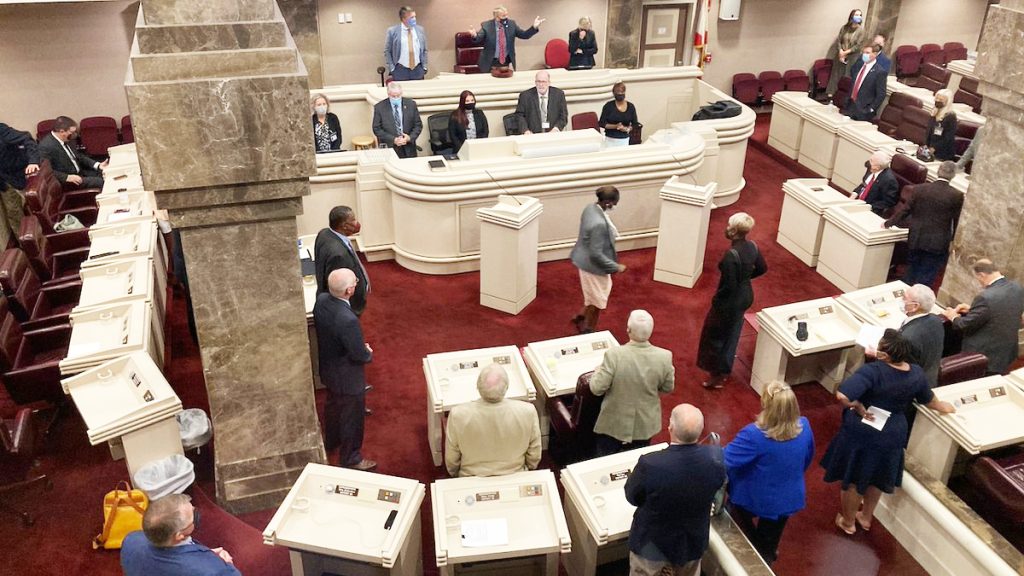This is an opinion column.
Alabama could help poor kids eat better next summer, but lawmakers have their hands stuck in their own pockets as they tap dance toward the end of the session.
Meanwhile, they hope you don’t see them fattening their slush funds for the summer instead.
It’s a routine we’ve seen many times before — foot shufflin’. They stare at their shoes or gaze thoughtfully at a water stain on the ceiling. Their weight shifts back and forth as they pretend to listen and feign soulful concern with a grimace or a nod, until finally they say, “I really wish I could, but …”
And then blame anything or anybody but themselves, hoping you don’t notice where the money goes.
You’ve seen foot shufflin’ sometime in your life, even if you’ve never spent time in the Alabama State House. Car dealers foot-shuffle when you ask for a better price. Customer service agents foot-shuffle when they won’t refund your money for the thing you didn’t agree to buy. I’ve foot-shuffled every time a friend asked if I wanted to taste their homebrew or come hear their band play this weekend.
At some point, we all foot-shuffle a little, but nobody foot-shuffles like an Alabama politician.
Kay Ivey has foot-shuffled every time someone brought up Medicaid expansion.
We don’t have the money, she says, before signing away another billion dollars for a prison.
When alums from my alma mater, Birmingham-Southern College, asked the state for a rescue loan, everybody down there foot-shuffled until the school went broke.
Sure, they put $30 million in a rescue account for distressed academic institutions, but when the college asked for the check — the legislature, the governor and the state treasurer — each pointed to the other in a foot-shufflin’ square dance.
And now, when the federal government has offered to give Alabama as much as $65 million a year to help poor kids eat over the summer, these same folks are foot-shufflin’ again.
Yeah, we’d like to, but … where’s the money?
Last year, the USDA offered states extra money to help poor kids eat over the summer when they’re not in school — if the states would foot the administrative costs. All but 15 states signed on quickly. Alabama wasn’t one of them.
Ivey’s office said the federal ask came too late for the Alabama Legislature to approve the local match — between $10 and $15 million, much of it one-time expenses, to draw down $65 million.
It’s not our fault. It was just bad timing …
That was fine for 2024, but what about 2025? The Alabama Legislature convened in February and has been meeting ever since but …
But nothing.
As my colleague Rebecca Griesbach reported last week, lawmakers act like they can’t find the money, even after one of them did.
Remember that $30 million that was set aside for BSC? Rep. Laura Hall figured if they weren’t going to give that money to a broke school, why not use it to feed hungry kids?
When lawmakers voted last week on what to do with education money leftover from last year, Hall introduced an amendment to shift $13 million of those funds to the summer food program.
Rep. Danny Garrett, R-Trussville, moved to table Hall’s amendment, and the Alabama House voted with him along party lines.
But that’s not the gross part. That happened next.
Rep. Scott Stadthagen, R-Hartsell, introduced his own amendment for the same money. Instead, of using that money to fund summer food for poor kids, his amendment split that money between a community grants program administered by Alabama lawmakers and an education discretionary account administered by the lieutenant governor.
Or as we sometimes call them, slush funds.
Lawmakers use this slush fund to hand out checks to community programs in their districts, usually with a photographer from the local newspaper standing nearby so they can get the credit. These things look great on Facebook, too.
Lawmakers love these sorts of programs, especially former Rep. John Rogers and Rep. Fred Plump, who now await sentencing after money Rogers handed out wound up back in their pockets.
Lawmakers love them so much that, when they voted on Stadthagen’s amendment, it passed — not just with bipartisan support, but unanimously.
Even Hall voted for it.
I called Garrett, who chairs the House education budget committee, to ask him what gives. Why not use that money to help fund the summer food program?
Between and lot of uhms and ahs, Garrett told me he had recently learned of this summer food program, even though there have been new stories about this program around the state since last year.
Garrett said he’s heard the Alabama Senate plans to add the food program to next year’s ETF budget, not the leftover education funds from 2024. He thinks he’ll support it then, he said.
Which sounds like all is handled, right? Only, the House passed its version of the ETF budget two weeks ago and didn’t include anything about the summer food program in there when it could have.
We were talking on the phone, so I couldn’t see if his feet were shuffling.
But better late, I suppose, unless later really means never.
But with only five days left in the 2024 session, time to dance is running out and the music is almost over.











